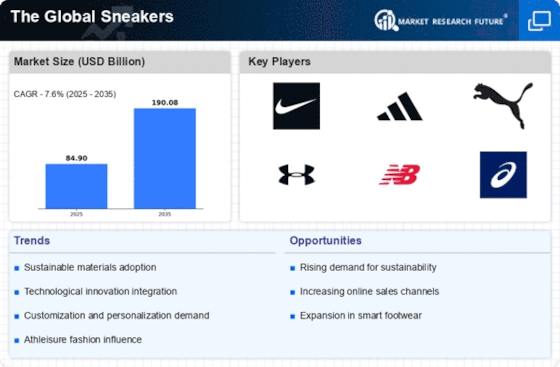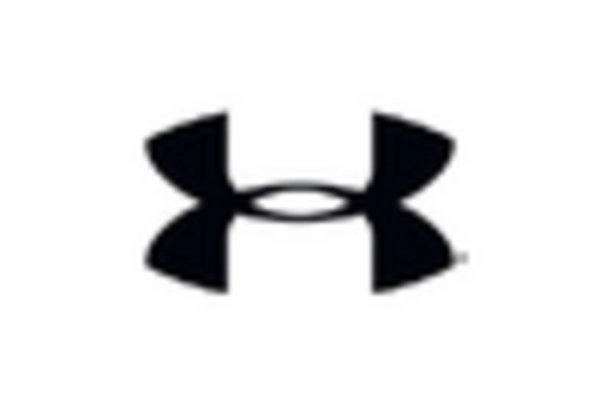-
EXECUTIVE SUMMARY
-
Market Overview
-
Key Findings
-
Market Segmentation
-
Competitive Landscape
-
Challenges and Opportunities
-
Future Outlook
-
MARKET INTRODUCTION
-
Definition
-
Scope of the study
- Research Objective
- Assumption
- Limitations
-
RESEARCH METHODOLOGY
-
Overview
-
Data Mining
-
Secondary Research
-
Primary Research
- Primary Interviews and Information Gathering Process
- Breakdown of Primary Respondents
-
Forecasting Model
-
Market Size Estimation
- Bottom-Up Approach
- Top-Down Approach
-
Data Triangulation
-
Validation
-
MARKET DYNAMICS
-
Overview
-
Drivers
-
Restraints
-
Opportunities
-
MARKET FACTOR ANALYSIS
-
Value chain Analysis
-
Porter's Five Forces Analysis
- Bargaining Power of Suppliers
- Bargaining Power of Buyers
- Threat of New Entrants
- Threat of Substitutes
- Intensity of Rivalry
-
COVID-19 Impact Analysis
- Market Impact Analysis
- Regional Impact
- Opportunity and Threat Analysis
-
SNEAKERS MARKET, BY TYPE (USD BILLION)
-
Athletic Sneakers
-
Lifestyle Sneakers
-
Fashion Sneakers
-
Outdoor Sneakers
-
SNEAKERS MARKET, BY END USER (USD BILLION)
-
Men
-
Women
-
Kids
-
SNEAKERS MARKET, BY MATERIAL (USD BILLION)
-
Leather
-
Textile
-
Synthetic
-
Rubber
-
SNEAKERS MARKET, BY DISTRIBUTION CHANNEL (USD BILLION)
-
Online
-
Offline
-
Retail Stores
-
SNEAKERS MARKET, BY REGIONAL (USD BILLION)
-
North America
- US
- Canada
-
Europe
- Germany
- UK
- France
- Russia
- Italy
- Spain
- Rest of Europe
-
APAC
- China
- India
- Japan
- South Korea
- Malaysia
- Thailand
- Indonesia
- Rest of APAC
-
South America
- Brazil
- Mexico
- Argentina
- Rest of South America
-
MEA
- GCC Countries
- South Africa
- Rest of MEA
-
COMPETITIVE LANDSCAPE
-
Overview
-
Competitive Analysis
-
Market share Analysis
-
Major Growth Strategy in the Sneakers Market
-
Competitive Benchmarking
-
Leading Players in Terms of Number of Developments in the Sneakers Market
-
Key developments and growth strategies
- New Product Launch/Service Deployment
- Merger & Acquisitions
- Joint Ventures
-
Major Players Financial Matrix
- Sales and Operating Income
- Major Players R&D Expenditure. 2023
-
COMPANY PROFILES
-
KSwiss
- Financial Overview
- Products Offered
- Key Developments
- SWOT Analysis
- Key Strategies
-
Puma
- Financial Overview
- Products Offered
- Key Developments
- SWOT Analysis
- Key Strategies
-
Fila
- Financial Overview
- Products Offered
- Key Developments
- SWOT Analysis
- Key Strategies
-
Under Armour
- Financial Overview
- Products Offered
- Key Developments
- SWOT Analysis
- Key Strategies
-
Adidas
- Financial Overview
- Products Offered
- Key Developments
- SWOT Analysis
- Key Strategies
-
Reebok
- Financial Overview
- Products Offered
- Key Developments
- SWOT Analysis
- Key Strategies
-
New Balance
- Financial Overview
- Products Offered
- Key Developments
- SWOT Analysis
- Key Strategies
-
Nike
- Financial Overview
- Products Offered
- Key Developments
- SWOT Analysis
- Key Strategies
-
Vans
- Financial Overview
- Products Offered
- Key Developments
- SWOT Analysis
- Key Strategies
-
Converse
- Financial Overview
- Products Offered
- Key Developments
- SWOT Analysis
- Key Strategies
-
On Running
- Financial Overview
- Products Offered
- Key Developments
- SWOT Analysis
- Key Strategies
-
Asics
- Financial Overview
- Products Offered
- Key Developments
- SWOT Analysis
- Key Strategies
-
Skechers
- Financial Overview
- Products Offered
- Key Developments
- SWOT Analysis
- Key Strategies
-
Saucony
- Financial Overview
- Products Offered
- Key Developments
- SWOT Analysis
- Key Strategies
-
Hoka One One
- Financial Overview
- Products Offered
- Key Developments
- SWOT Analysis
- Key Strategies
-
APPENDIX
-
References
-
Related Reports
-
LIST OF TABLES
-
LIST OF ASSUMPTIONS
-
NORTH AMERICA SNEAKERS MARKET SIZE ESTIMATES & FORECAST, BY TYPE, 2019-2035 (USD BILLIONS)
-
NORTH AMERICA SNEAKERS MARKET SIZE ESTIMATES & FORECAST, BY END USER, 2019-2035 (USD BILLIONS)
-
NORTH AMERICA SNEAKERS MARKET SIZE ESTIMATES & FORECAST, BY MATERIAL, 2019-2035 (USD BILLIONS)
-
NORTH AMERICA SNEAKERS MARKET SIZE ESTIMATES & FORECAST, BY DISTRIBUTION CHANNEL, 2019-2035 (USD BILLIONS)
-
NORTH AMERICA SNEAKERS MARKET SIZE ESTIMATES & FORECAST, BY REGIONAL, 2019-2035 (USD BILLIONS)
-
US SNEAKERS MARKET SIZE ESTIMATES & FORECAST, BY TYPE, 2019-2035 (USD BILLIONS)
-
US SNEAKERS MARKET SIZE ESTIMATES & FORECAST, BY END USER, 2019-2035 (USD BILLIONS)
-
US SNEAKERS MARKET SIZE ESTIMATES & FORECAST, BY MATERIAL, 2019-2035 (USD BILLIONS)
-
US SNEAKERS MARKET SIZE ESTIMATES & FORECAST, BY DISTRIBUTION CHANNEL, 2019-2035 (USD BILLIONS)
-
US SNEAKERS MARKET SIZE ESTIMATES & FORECAST, BY REGIONAL, 2019-2035 (USD BILLIONS)
-
CANADA SNEAKERS MARKET SIZE ESTIMATES & FORECAST, BY TYPE, 2019-2035 (USD BILLIONS)
-
CANADA SNEAKERS MARKET SIZE ESTIMATES & FORECAST, BY END USER, 2019-2035 (USD BILLIONS)
-
CANADA SNEAKERS MARKET SIZE ESTIMATES & FORECAST, BY MATERIAL, 2019-2035 (USD BILLIONS)
-
CANADA SNEAKERS MARKET SIZE ESTIMATES & FORECAST, BY DISTRIBUTION CHANNEL, 2019-2035 (USD BILLIONS)
-
CANADA SNEAKERS MARKET SIZE ESTIMATES & FORECAST, BY REGIONAL, 2019-2035 (USD BILLIONS)
-
EUROPE SNEAKERS MARKET SIZE ESTIMATES & FORECAST, BY TYPE, 2019-2035 (USD BILLIONS)
-
EUROPE SNEAKERS MARKET SIZE ESTIMATES & FORECAST, BY END USER, 2019-2035 (USD BILLIONS)
-
EUROPE SNEAKERS MARKET SIZE ESTIMATES & FORECAST, BY MATERIAL, 2019-2035 (USD BILLIONS)
-
EUROPE SNEAKERS MARKET SIZE ESTIMATES & FORECAST, BY DISTRIBUTION CHANNEL, 2019-2035 (USD BILLIONS)
-
EUROPE SNEAKERS MARKET SIZE ESTIMATES & FORECAST, BY REGIONAL, 2019-2035 (USD BILLIONS)
-
GERMANY SNEAKERS MARKET SIZE ESTIMATES & FORECAST, BY TYPE, 2019-2035 (USD BILLIONS)
-
GERMANY SNEAKERS MARKET SIZE ESTIMATES & FORECAST, BY END USER, 2019-2035 (USD BILLIONS)
-
GERMANY SNEAKERS MARKET SIZE ESTIMATES & FORECAST, BY MATERIAL, 2019-2035 (USD BILLIONS)
-
GERMANY SNEAKERS MARKET SIZE ESTIMATES & FORECAST, BY DISTRIBUTION CHANNEL, 2019-2035 (USD BILLIONS)
-
GERMANY SNEAKERS MARKET SIZE ESTIMATES & FORECAST, BY REGIONAL, 2019-2035 (USD BILLIONS)
-
UK SNEAKERS MARKET SIZE ESTIMATES & FORECAST, BY TYPE, 2019-2035 (USD BILLIONS)
-
UK SNEAKERS MARKET SIZE ESTIMATES & FORECAST, BY END USER, 2019-2035 (USD BILLIONS)
-
UK SNEAKERS MARKET SIZE ESTIMATES & FORECAST, BY MATERIAL, 2019-2035 (USD BILLIONS)
-
UK SNEAKERS MARKET SIZE ESTIMATES & FORECAST, BY DISTRIBUTION CHANNEL, 2019-2035 (USD BILLIONS)
-
UK SNEAKERS MARKET SIZE ESTIMATES & FORECAST, BY REGIONAL, 2019-2035 (USD BILLIONS)
-
FRANCE SNEAKERS MARKET SIZE ESTIMATES & FORECAST, BY TYPE, 2019-2035 (USD BILLIONS)
-
FRANCE SNEAKERS MARKET SIZE ESTIMATES & FORECAST, BY END USER, 2019-2035 (USD BILLIONS)
-
FRANCE SNEAKERS MARKET SIZE ESTIMATES & FORECAST, BY MATERIAL, 2019-2035 (USD BILLIONS)
-
FRANCE SNEAKERS MARKET SIZE ESTIMATES & FORECAST, BY DISTRIBUTION CHANNEL, 2019-2035 (USD BILLIONS)
-
FRANCE SNEAKERS MARKET SIZE ESTIMATES & FORECAST, BY REGIONAL, 2019-2035 (USD BILLIONS)
-
RUSSIA SNEAKERS MARKET SIZE ESTIMATES & FORECAST, BY TYPE, 2019-2035 (USD BILLIONS)
-
RUSSIA SNEAKERS MARKET SIZE ESTIMATES & FORECAST, BY END USER, 2019-2035 (USD BILLIONS)
-
RUSSIA SNEAKERS MARKET SIZE ESTIMATES & FORECAST, BY MATERIAL, 2019-2035 (USD BILLIONS)
-
RUSSIA SNEAKERS MARKET SIZE ESTIMATES & FORECAST, BY DISTRIBUTION CHANNEL, 2019-2035 (USD BILLIONS)
-
RUSSIA SNEAKERS MARKET SIZE ESTIMATES & FORECAST, BY REGIONAL, 2019-2035 (USD BILLIONS)
-
ITALY SNEAKERS MARKET SIZE ESTIMATES & FORECAST, BY TYPE, 2019-2035 (USD BILLIONS)
-
ITALY SNEAKERS MARKET SIZE ESTIMATES & FORECAST, BY END USER, 2019-2035 (USD BILLIONS)
-
ITALY SNEAKERS MARKET SIZE ESTIMATES & FORECAST, BY MATERIAL, 2019-2035 (USD BILLIONS)
-
ITALY SNEAKERS MARKET SIZE ESTIMATES & FORECAST, BY DISTRIBUTION CHANNEL, 2019-2035 (USD BILLIONS)
-
ITALY SNEAKERS MARKET SIZE ESTIMATES & FORECAST, BY REGIONAL, 2019-2035 (USD BILLIONS)
-
SPAIN SNEAKERS MARKET SIZE ESTIMATES & FORECAST, BY TYPE, 2019-2035 (USD BILLIONS)
-
SPAIN SNEAKERS MARKET SIZE ESTIMATES & FORECAST, BY END USER, 2019-2035 (USD BILLIONS)
-
SPAIN SNEAKERS MARKET SIZE ESTIMATES & FORECAST, BY MATERIAL, 2019-2035 (USD BILLIONS)
-
SPAIN SNEAKERS MARKET SIZE ESTIMATES & FORECAST, BY DISTRIBUTION CHANNEL, 2019-2035 (USD BILLIONS)
-
SPAIN SNEAKERS MARKET SIZE ESTIMATES & FORECAST, BY REGIONAL, 2019-2035 (USD BILLIONS)
-
REST OF EUROPE SNEAKERS MARKET SIZE ESTIMATES & FORECAST, BY TYPE, 2019-2035 (USD BILLIONS)
-
REST OF EUROPE SNEAKERS MARKET SIZE ESTIMATES & FORECAST, BY END USER, 2019-2035 (USD BILLIONS)
-
REST OF EUROPE SNEAKERS MARKET SIZE ESTIMATES & FORECAST, BY MATERIAL, 2019-2035 (USD BILLIONS)
-
REST OF EUROPE SNEAKERS MARKET SIZE ESTIMATES & FORECAST, BY DISTRIBUTION CHANNEL, 2019-2035 (USD BILLIONS)
-
REST OF EUROPE SNEAKERS MARKET SIZE ESTIMATES & FORECAST, BY REGIONAL, 2019-2035 (USD BILLIONS)
-
APAC SNEAKERS MARKET SIZE ESTIMATES & FORECAST, BY TYPE, 2019-2035 (USD BILLIONS)
-
APAC SNEAKERS MARKET SIZE ESTIMATES & FORECAST, BY END USER, 2019-2035 (USD BILLIONS)
-
APAC SNEAKERS MARKET SIZE ESTIMATES & FORECAST, BY MATERIAL, 2019-2035 (USD BILLIONS)
-
APAC SNEAKERS MARKET SIZE ESTIMATES & FORECAST, BY DISTRIBUTION CHANNEL, 2019-2035 (USD BILLIONS)
-
APAC SNEAKERS MARKET SIZE ESTIMATES & FORECAST, BY REGIONAL, 2019-2035 (USD BILLIONS)
-
CHINA SNEAKERS MARKET SIZE ESTIMATES & FORECAST, BY TYPE, 2019-2035 (USD BILLIONS)
-
CHINA SNEAKERS MARKET SIZE ESTIMATES & FORECAST, BY END USER, 2019-2035 (USD BILLIONS)
-
CHINA SNEAKERS MARKET SIZE ESTIMATES & FORECAST, BY MATERIAL, 2019-2035 (USD BILLIONS)
-
CHINA SNEAKERS MARKET SIZE ESTIMATES & FORECAST, BY DISTRIBUTION CHANNEL, 2019-2035 (USD BILLIONS)
-
CHINA SNEAKERS MARKET SIZE ESTIMATES & FORECAST, BY REGIONAL, 2019-2035 (USD BILLIONS)
-
INDIA SNEAKERS MARKET SIZE ESTIMATES & FORECAST, BY TYPE, 2019-2035 (USD BILLIONS)
-
INDIA SNEAKERS MARKET SIZE ESTIMATES & FORECAST, BY END USER, 2019-2035 (USD BILLIONS)
-
INDIA SNEAKERS MARKET SIZE ESTIMATES & FORECAST, BY MATERIAL, 2019-2035 (USD BILLIONS)
-
INDIA SNEAKERS MARKET SIZE ESTIMATES & FORECAST, BY DISTRIBUTION CHANNEL, 2019-2035 (USD BILLIONS)
-
INDIA SNEAKERS MARKET SIZE ESTIMATES & FORECAST, BY REGIONAL, 2019-2035 (USD BILLIONS)
-
JAPAN SNEAKERS MARKET SIZE ESTIMATES & FORECAST, BY TYPE, 2019-2035 (USD BILLIONS)
-
JAPAN SNEAKERS MARKET SIZE ESTIMATES & FORECAST, BY END USER, 2019-2035 (USD BILLIONS)
-
JAPAN SNEAKERS MARKET SIZE ESTIMATES & FORECAST, BY MATERIAL, 2019-2035 (USD BILLIONS)
-
JAPAN SNEAKERS MARKET SIZE ESTIMATES & FORECAST, BY DISTRIBUTION CHANNEL, 2019-2035 (USD BILLIONS)
-
JAPAN SNEAKERS MARKET SIZE ESTIMATES & FORECAST, BY REGIONAL, 2019-2035 (USD BILLIONS)
-
SOUTH KOREA SNEAKERS MARKET SIZE ESTIMATES & FORECAST, BY TYPE, 2019-2035 (USD BILLIONS)
-
SOUTH KOREA SNEAKERS MARKET SIZE ESTIMATES & FORECAST, BY END USER, 2019-2035 (USD BILLIONS)
-
SOUTH KOREA SNEAKERS MARKET SIZE ESTIMATES & FORECAST, BY MATERIAL, 2019-2035 (USD BILLIONS)
-
SOUTH KOREA SNEAKERS MARKET SIZE ESTIMATES & FORECAST, BY DISTRIBUTION CHANNEL, 2019-2035 (USD BILLIONS)
-
SOUTH KOREA SNEAKERS MARKET SIZE ESTIMATES & FORECAST, BY REGIONAL, 2019-2035 (USD BILLIONS)
-
MALAYSIA SNEAKERS MARKET SIZE ESTIMATES & FORECAST, BY TYPE, 2019-2035 (USD BILLIONS)
-
MALAYSIA SNEAKERS MARKET SIZE ESTIMATES & FORECAST, BY END USER, 2019-2035 (USD BILLIONS)
-
MALAYSIA SNEAKERS MARKET SIZE ESTIMATES & FORECAST, BY MATERIAL, 2019-2035 (USD BILLIONS)
-
MALAYSIA SNEAKERS MARKET SIZE ESTIMATES & FORECAST, BY DISTRIBUTION CHANNEL, 2019-2035 (USD BILLIONS)
-
MALAYSIA SNEAKERS MARKET SIZE ESTIMATES & FORECAST, BY REGIONAL, 2019-2035 (USD BILLIONS)
-
THAILAND SNEAKERS MARKET SIZE ESTIMATES & FORECAST, BY TYPE, 2019-2035 (USD BILLIONS)
-
THAILAND SNEAKERS MARKET SIZE ESTIMATES & FORECAST, BY END USER, 2019-2035 (USD BILLIONS)
-
THAILAND SNEAKERS MARKET SIZE ESTIMATES & FORECAST, BY MATERIAL, 2019-2035 (USD BILLIONS)
-
THAILAND SNEAKERS MARKET SIZE ESTIMATES & FORECAST, BY DISTRIBUTION CHANNEL, 2019-2035 (USD BILLIONS)
-
THAILAND SNEAKERS MARKET SIZE ESTIMATES & FORECAST, BY REGIONAL, 2019-2035 (USD BILLIONS)
-
INDONESIA SNEAKERS MARKET SIZE ESTIMATES & FORECAST, BY TYPE, 2019-2035 (USD BILLIONS)
-
INDONESIA SNEAKERS MARKET SIZE ESTIMATES & FORECAST, BY END USER, 2019-2035 (USD BILLIONS)
-
INDONESIA SNEAKERS MARKET SIZE ESTIMATES & FORECAST, BY MATERIAL, 2019-2035 (USD BILLIONS)
-
INDONESIA SNEAKERS MARKET SIZE ESTIMATES & FORECAST, BY DISTRIBUTION CHANNEL, 2019-2035 (USD BILLIONS)
-
INDONESIA SNEAKERS MARKET SIZE ESTIMATES & FORECAST, BY REGIONAL, 2019-2035 (USD BILLIONS)
-
REST OF APAC SNEAKERS MARKET SIZE ESTIMATES & FORECAST, BY TYPE, 2019-2035 (USD BILLIONS)
-
REST OF APAC SNEAKERS MARKET SIZE ESTIMATES & FORECAST, BY END USER, 2019-2035 (USD BILLIONS)
-
REST OF APAC SNEAKERS MARKET SIZE ESTIMATES & FORECAST, BY MATERIAL, 2019-2035 (USD BILLIONS)
-
REST OF APAC SNEAKERS MARKET SIZE ESTIMATES & FORECAST, BY DISTRIBUTION CHANNEL, 2019-2035 (USD BILLIONS)
-
REST OF APAC SNEAKERS MARKET SIZE ESTIMATES & FORECAST, BY REGIONAL, 2019-2035 (USD BILLIONS)
-
SOUTH AMERICA SNEAKERS MARKET SIZE ESTIMATES & FORECAST, BY TYPE, 2019-2035 (USD BILLIONS)
-
SOUTH AMERICA SNEAKERS MARKET SIZE ESTIMATES & FORECAST, BY END USER, 2019-2035 (USD BILLIONS)
-
SOUTH AMERICA SNEAKERS MARKET SIZE ESTIMATES & FORECAST, BY MATERIAL, 2019-2035 (USD BILLIONS)
-
SOUTH AMERICA SNEAKERS MARKET SIZE ESTIMATES & FORECAST, BY DISTRIBUTION CHANNEL, 2019-2035 (USD BILLIONS)
-
SOUTH AMERICA SNEAKERS MARKET SIZE ESTIMATES & FORECAST, BY REGIONAL, 2019-2035 (USD BILLIONS)
-
BRAZIL SNEAKERS MARKET SIZE ESTIMATES & FORECAST, BY TYPE, 2019-2035 (USD BILLIONS)
-
BRAZIL SNEAKERS MARKET SIZE ESTIMATES & FORECAST, BY END USER, 2019-2035 (USD BILLIONS)
-
BRAZIL SNEAKERS MARKET SIZE ESTIMATES & FORECAST, BY MATERIAL, 2019-2035 (USD BILLIONS)
-
BRAZIL SNEAKERS MARKET SIZE ESTIMATES & FORECAST, BY DISTRIBUTION CHANNEL, 2019-2035 (USD BILLIONS)
-
BRAZIL SNEAKERS MARKET SIZE ESTIMATES & FORECAST, BY REGIONAL, 2019-2035 (USD BILLIONS)
-
MEXICO SNEAKERS MARKET SIZE ESTIMATES & FORECAST, BY TYPE, 2019-2035 (USD BILLIONS)
-
MEXICO SNEAKERS MARKET SIZE ESTIMATES & FORECAST, BY END USER, 2019-2035 (USD BILLIONS)
-
MEXICO SNEAKERS MARKET SIZE ESTIMATES & FORECAST, BY MATERIAL, 2019-2035 (USD BILLIONS)
-
MEXICO SNEAKERS MARKET SIZE ESTIMATES & FORECAST, BY DISTRIBUTION CHANNEL, 2019-2035 (USD BILLIONS)
-
MEXICO SNEAKERS MARKET SIZE ESTIMATES & FORECAST, BY REGIONAL, 2019-2035 (USD BILLIONS)
-
ARGENTINA SNEAKERS MARKET SIZE ESTIMATES & FORECAST, BY TYPE, 2019-2035 (USD BILLIONS)
-
ARGENTINA SNEAKERS MARKET SIZE ESTIMATES & FORECAST, BY END USER, 2019-2035 (USD BILLIONS)
-
ARGENTINA SNEAKERS MARKET SIZE ESTIMATES & FORECAST, BY MATERIAL, 2019-2035 (USD BILLIONS)
-
ARGENTINA SNEAKERS MARKET SIZE ESTIMATES & FORECAST, BY DISTRIBUTION CHANNEL, 2019-2035 (USD BILLIONS)
-
ARGENTINA SNEAKERS MARKET SIZE ESTIMATES & FORECAST, BY REGIONAL, 2019-2035 (USD BILLIONS)
-
REST OF SOUTH AMERICA SNEAKERS MARKET SIZE ESTIMATES & FORECAST, BY TYPE, 2019-2035 (USD BILLIONS)
-
REST OF SOUTH AMERICA SNEAKERS MARKET SIZE ESTIMATES & FORECAST, BY END USER, 2019-2035 (USD BILLIONS)
-
REST OF SOUTH AMERICA SNEAKERS MARKET SIZE ESTIMATES & FORECAST, BY MATERIAL, 2019-2035 (USD BILLIONS)
-
REST OF SOUTH AMERICA SNEAKERS MARKET SIZE ESTIMATES & FORECAST, BY DISTRIBUTION CHANNEL, 2019-2035 (USD BILLIONS)
-
REST OF SOUTH AMERICA SNEAKERS MARKET SIZE ESTIMATES & FORECAST, BY REGIONAL, 2019-2035 (USD BILLIONS)
-
MEA SNEAKERS MARKET SIZE ESTIMATES & FORECAST, BY TYPE, 2019-2035 (USD BILLIONS)
-
MEA SNEAKERS MARKET SIZE ESTIMATES & FORECAST, BY END USER, 2019-2035 (USD BILLIONS)
-
MEA SNEAKERS MARKET SIZE ESTIMATES & FORECAST, BY MATERIAL, 2019-2035 (USD BILLIONS)
-
MEA SNEAKERS MARKET SIZE ESTIMATES & FORECAST, BY DISTRIBUTION CHANNEL, 2019-2035 (USD BILLIONS)
-
MEA SNEAKERS MARKET SIZE ESTIMATES & FORECAST, BY REGIONAL, 2019-2035 (USD BILLIONS)
-
GCC COUNTRIES SNEAKERS MARKET SIZE ESTIMATES & FORECAST, BY TYPE, 2019-2035 (USD BILLIONS)
-
GCC COUNTRIES SNEAKERS MARKET SIZE ESTIMATES & FORECAST, BY END USER, 2019-2035 (USD BILLIONS)
-
GCC COUNTRIES SNEAKERS MARKET SIZE ESTIMATES & FORECAST, BY MATERIAL, 2019-2035 (USD BILLIONS)
-
GCC COUNTRIES SNEAKERS MARKET SIZE ESTIMATES & FORECAST, BY DISTRIBUTION CHANNEL, 2019-2035 (USD BILLIONS)
-
GCC COUNTRIES SNEAKERS MARKET SIZE ESTIMATES & FORECAST, BY REGIONAL, 2019-2035 (USD BILLIONS)
-
SOUTH AFRICA SNEAKERS MARKET SIZE ESTIMATES & FORECAST, BY TYPE, 2019-2035 (USD BILLIONS)
-
SOUTH AFRICA SNEAKERS MARKET SIZE ESTIMATES & FORECAST, BY END USER, 2019-2035 (USD BILLIONS)
-
SOUTH AFRICA SNEAKERS MARKET SIZE ESTIMATES & FORECAST, BY MATERIAL, 2019-2035 (USD BILLIONS)
-
SOUTH AFRICA SNEAKERS MARKET SIZE ESTIMATES & FORECAST, BY DISTRIBUTION CHANNEL, 2019-2035 (USD BILLIONS)
-
SOUTH AFRICA SNEAKERS MARKET SIZE ESTIMATES & FORECAST, BY REGIONAL, 2019-2035 (USD BILLIONS)
-
REST OF MEA SNEAKERS MARKET SIZE ESTIMATES & FORECAST, BY TYPE, 2019-2035 (USD BILLIONS)
-
REST OF MEA SNEAKERS MARKET SIZE ESTIMATES & FORECAST, BY END USER, 2019-2035 (USD BILLIONS)
-
REST OF MEA SNEAKERS MARKET SIZE ESTIMATES & FORECAST, BY MATERIAL, 2019-2035 (USD BILLIONS)
-
REST OF MEA SNEAKERS MARKET SIZE ESTIMATES & FORECAST, BY DISTRIBUTION CHANNEL, 2019-2035 (USD BILLIONS)
-
REST OF MEA SNEAKERS MARKET SIZE ESTIMATES & FORECAST, BY REGIONAL, 2019-2035 (USD BILLIONS)
-
PRODUCT LAUNCH/PRODUCT DEVELOPMENT/APPROVAL
-
ACQUISITION/PARTNERSHIP
-
LIST OF FIGURES
-
MARKET SYNOPSIS
-
NORTH AMERICA SNEAKERS MARKET ANALYSIS
-
US SNEAKERS MARKET ANALYSIS BY TYPE
-
US SNEAKERS MARKET ANALYSIS BY END USER
-
US SNEAKERS MARKET ANALYSIS BY MATERIAL
-
US SNEAKERS MARKET ANALYSIS BY DISTRIBUTION CHANNEL
-
US SNEAKERS MARKET ANALYSIS BY REGIONAL
-
CANADA SNEAKERS MARKET ANALYSIS BY TYPE
-
CANADA SNEAKERS MARKET ANALYSIS BY END USER
-
CANADA SNEAKERS MARKET ANALYSIS BY MATERIAL
-
CANADA SNEAKERS MARKET ANALYSIS BY DISTRIBUTION CHANNEL
-
CANADA SNEAKERS MARKET ANALYSIS BY REGIONAL
-
EUROPE SNEAKERS MARKET ANALYSIS
-
GERMANY SNEAKERS MARKET ANALYSIS BY TYPE
-
GERMANY SNEAKERS MARKET ANALYSIS BY END USER
-
GERMANY SNEAKERS MARKET ANALYSIS BY MATERIAL
-
GERMANY SNEAKERS MARKET ANALYSIS BY DISTRIBUTION CHANNEL
-
GERMANY SNEAKERS MARKET ANALYSIS BY REGIONAL
-
UK SNEAKERS MARKET ANALYSIS BY TYPE
-
UK SNEAKERS MARKET ANALYSIS BY END USER
-
UK SNEAKERS MARKET ANALYSIS BY MATERIAL
-
UK SNEAKERS MARKET ANALYSIS BY DISTRIBUTION CHANNEL
-
UK SNEAKERS MARKET ANALYSIS BY REGIONAL
-
FRANCE SNEAKERS MARKET ANALYSIS BY TYPE
-
FRANCE SNEAKERS MARKET ANALYSIS BY END USER
-
FRANCE SNEAKERS MARKET ANALYSIS BY MATERIAL
-
FRANCE SNEAKERS MARKET ANALYSIS BY DISTRIBUTION CHANNEL
-
FRANCE SNEAKERS MARKET ANALYSIS BY REGIONAL
-
RUSSIA SNEAKERS MARKET ANALYSIS BY TYPE
-
RUSSIA SNEAKERS MARKET ANALYSIS BY END USER
-
RUSSIA SNEAKERS MARKET ANALYSIS BY MATERIAL
-
RUSSIA SNEAKERS MARKET ANALYSIS BY DISTRIBUTION CHANNEL
-
RUSSIA SNEAKERS MARKET ANALYSIS BY REGIONAL
-
ITALY SNEAKERS MARKET ANALYSIS BY TYPE
-
ITALY SNEAKERS MARKET ANALYSIS BY END USER
-
ITALY SNEAKERS MARKET ANALYSIS BY MATERIAL
-
ITALY SNEAKERS MARKET ANALYSIS BY DISTRIBUTION CHANNEL
-
ITALY SNEAKERS MARKET ANALYSIS BY REGIONAL
-
SPAIN SNEAKERS MARKET ANALYSIS BY TYPE
-
SPAIN SNEAKERS MARKET ANALYSIS BY END USER
-
SPAIN SNEAKERS MARKET ANALYSIS BY MATERIAL
-
SPAIN SNEAKERS MARKET ANALYSIS BY DISTRIBUTION CHANNEL
-
SPAIN SNEAKERS MARKET ANALYSIS BY REGIONAL
-
REST OF EUROPE SNEAKERS MARKET ANALYSIS BY TYPE
-
REST OF EUROPE SNEAKERS MARKET ANALYSIS BY END USER
-
REST OF EUROPE SNEAKERS MARKET ANALYSIS BY MATERIAL
-
REST OF EUROPE SNEAKERS MARKET ANALYSIS BY DISTRIBUTION CHANNEL
-
REST OF EUROPE SNEAKERS MARKET ANALYSIS BY REGIONAL
-
APAC SNEAKERS MARKET ANALYSIS
-
CHINA SNEAKERS MARKET ANALYSIS BY TYPE
-
CHINA SNEAKERS MARKET ANALYSIS BY END USER
-
CHINA SNEAKERS MARKET ANALYSIS BY MATERIAL
-
CHINA SNEAKERS MARKET ANALYSIS BY DISTRIBUTION CHANNEL
-
CHINA SNEAKERS MARKET ANALYSIS BY REGIONAL
-
INDIA SNEAKERS MARKET ANALYSIS BY TYPE
-
INDIA SNEAKERS MARKET ANALYSIS BY END USER
-
INDIA SNEAKERS MARKET ANALYSIS BY MATERIAL
-
INDIA SNEAKERS MARKET ANALYSIS BY DISTRIBUTION CHANNEL
-
INDIA SNEAKERS MARKET ANALYSIS BY REGIONAL
-
JAPAN SNEAKERS MARKET ANALYSIS BY TYPE
-
JAPAN SNEAKERS MARKET ANALYSIS BY END USER
-
JAPAN SNEAKERS MARKET ANALYSIS BY MATERIAL
-
JAPAN SNEAKERS MARKET ANALYSIS BY DISTRIBUTION CHANNEL
-
JAPAN SNEAKERS MARKET ANALYSIS BY REGIONAL
-
SOUTH KOREA SNEAKERS MARKET ANALYSIS BY TYPE
-
SOUTH KOREA SNEAKERS MARKET ANALYSIS BY END USER
-
SOUTH KOREA SNEAKERS MARKET ANALYSIS BY MATERIAL
-
SOUTH KOREA SNEAKERS MARKET ANALYSIS BY DISTRIBUTION CHANNEL
-
SOUTH KOREA SNEAKERS MARKET ANALYSIS BY REGIONAL
-
MALAYSIA SNEAKERS MARKET ANALYSIS BY TYPE
-
MALAYSIA SNEAKERS MARKET ANALYSIS BY END USER
-
MALAYSIA SNEAKERS MARKET ANALYSIS BY MATERIAL
-
MALAYSIA SNEAKERS MARKET ANALYSIS BY DISTRIBUTION CHANNEL
-
MALAYSIA SNEAKERS MARKET ANALYSIS BY REGIONAL
-
THAILAND SNEAKERS MARKET ANALYSIS BY TYPE
-
THAILAND SNEAKERS MARKET ANALYSIS BY END USER
-
THAILAND SNEAKERS MARKET ANALYSIS BY MATERIAL
-
THAILAND SNEAKERS MARKET ANALYSIS BY DISTRIBUTION CHANNEL
-
THAILAND SNEAKERS MARKET ANALYSIS BY REGIONAL
-
INDONESIA SNEAKERS MARKET ANALYSIS BY TYPE
-
INDONESIA SNEAKERS MARKET ANALYSIS BY END USER
-
INDONESIA SNEAKERS MARKET ANALYSIS BY MATERIAL
-
INDONESIA SNEAKERS MARKET ANALYSIS BY DISTRIBUTION CHANNEL
-
INDONESIA SNEAKERS MARKET ANALYSIS BY REGIONAL
-
REST OF APAC SNEAKERS MARKET ANALYSIS BY TYPE
-
REST OF APAC SNEAKERS MARKET ANALYSIS BY END USER
-
REST OF APAC SNEAKERS MARKET ANALYSIS BY MATERIAL
-
REST OF APAC SNEAKERS MARKET ANALYSIS BY DISTRIBUTION CHANNEL
-
REST OF APAC SNEAKERS MARKET ANALYSIS BY REGIONAL
-
SOUTH AMERICA SNEAKERS MARKET ANALYSIS
-
BRAZIL SNEAKERS MARKET ANALYSIS BY TYPE
-
BRAZIL SNEAKERS MARKET ANALYSIS BY END USER
-
BRAZIL SNEAKERS MARKET ANALYSIS BY MATERIAL
-
BRAZIL SNEAKERS MARKET ANALYSIS BY DISTRIBUTION CHANNEL
-
BRAZIL SNEAKERS MARKET ANALYSIS BY REGIONAL
-
MEXICO SNEAKERS MARKET ANALYSIS BY TYPE
-
MEXICO SNEAKERS MARKET ANALYSIS BY END USER
-
MEXICO SNEAKERS MARKET ANALYSIS BY MATERIAL
-
MEXICO SNEAKERS MARKET ANALYSIS BY DISTRIBUTION CHANNEL
-
MEXICO SNEAKERS MARKET ANALYSIS BY REGIONAL
-
ARGENTINA SNEAKERS MARKET ANALYSIS BY TYPE
-
ARGENTINA SNEAKERS MARKET ANALYSIS BY END USER
-
ARGENTINA SNEAKERS MARKET ANALYSIS BY MATERIAL
-
ARGENTINA SNEAKERS MARKET ANALYSIS BY DISTRIBUTION CHANNEL
-
ARGENTINA SNEAKERS MARKET ANALYSIS BY REGIONAL
-
REST OF SOUTH AMERICA SNEAKERS MARKET ANALYSIS BY TYPE
-
REST OF SOUTH AMERICA SNEAKERS MARKET ANALYSIS BY END USER
-
REST OF SOUTH AMERICA SNEAKERS MARKET ANALYSIS BY MATERIAL
-
REST OF SOUTH AMERICA SNEAKERS MARKET ANALYSIS BY DISTRIBUTION CHANNEL
-
REST OF SOUTH AMERICA SNEAKERS MARKET ANALYSIS BY REGIONAL
-
MEA SNEAKERS MARKET ANALYSIS
-
GCC COUNTRIES SNEAKERS MARKET ANALYSIS BY TYPE
-
GCC COUNTRIES SNEAKERS MARKET ANALYSIS BY END USER
-
GCC COUNTRIES SNEAKERS MARKET ANALYSIS BY MATERIAL
-
GCC COUNTRIES SNEAKERS MARKET ANALYSIS BY DISTRIBUTION CHANNEL
-
GCC COUNTRIES SNEAKERS MARKET ANALYSIS BY REGIONAL
-
SOUTH AFRICA SNEAKERS MARKET ANALYSIS BY TYPE
-
SOUTH AFRICA SNEAKERS MARKET ANALYSIS BY END USER
-
SOUTH AFRICA SNEAKERS MARKET ANALYSIS BY MATERIAL
-
SOUTH AFRICA SNEAKERS MARKET ANALYSIS BY DISTRIBUTION CHANNEL
-
SOUTH AFRICA SNEAKERS MARKET ANALYSIS BY REGIONAL
-
REST OF MEA SNEAKERS MARKET ANALYSIS BY TYPE
-
REST OF MEA SNEAKERS MARKET ANALYSIS BY END USER
-
REST OF MEA SNEAKERS MARKET ANALYSIS BY MATERIAL
-
REST OF MEA SNEAKERS MARKET ANALYSIS BY DISTRIBUTION CHANNEL
-
REST OF MEA SNEAKERS MARKET ANALYSIS BY REGIONAL
-
KEY BUYING CRITERIA OF SNEAKERS MARKET
-
RESEARCH PROCESS OF MRFR
-
DRO ANALYSIS OF SNEAKERS MARKET
-
DRIVERS IMPACT ANALYSIS: SNEAKERS MARKET
-
RESTRAINTS IMPACT ANALYSIS: SNEAKERS MARKET
-
SUPPLY / VALUE CHAIN: SNEAKERS MARKET
-
SNEAKERS MARKET, BY TYPE, 2025 (% SHARE)
-
SNEAKERS MARKET, BY TYPE, 2019 TO 2035 (USD Billions)
-
SNEAKERS MARKET, BY END USER, 2025 (% SHARE)
-
SNEAKERS MARKET, BY END USER, 2019 TO 2035 (USD Billions)
-
SNEAKERS MARKET, BY MATERIAL, 2025 (% SHARE)
-
SNEAKERS MARKET, BY MATERIAL, 2019 TO 2035 (USD Billions)
-
SNEAKERS MARKET, BY DISTRIBUTION CHANNEL, 2025 (% SHARE)
-
SNEAKERS MARKET, BY DISTRIBUTION CHANNEL, 2019 TO 2035 (USD Billions)
-
SNEAKERS MARKET, BY REGIONAL, 2025 (% SHARE)
-
SNEAKERS MARKET, BY REGIONAL, 2019 TO 2035 (USD Billions)
-
BENCHMARKING OF MAJOR COMPETITORS


















Leave a Comment